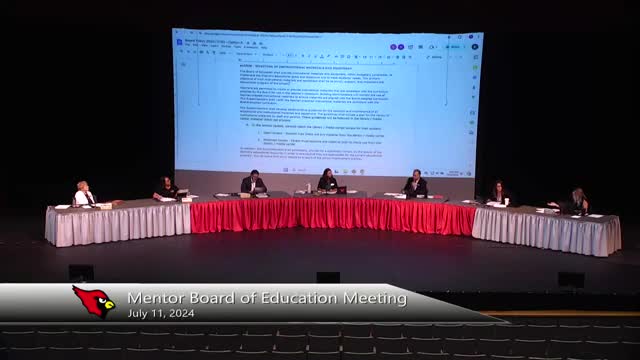School Board Debates Controversial Sexual Content Policy Changes
July 12, 2024 | Mentor Exempted Village, School Districts, Ohio

This article was created by AI summarizing key points discussed. AI makes mistakes, so for full details and context, please refer to the video of the full meeting. Please report any errors so we can fix them. Report an error »

In a recent government meeting, heated discussions centered around a controversial sexual content policy affecting library materials in schools. The policy, which aims to notify parents when their children check out books containing sexually explicit content, has sparked significant debate among board members and community members alike.
One board member emphasized the importance of transparency and parental involvement, arguing that the policy is not censorship but rather a protective measure for students. They cited a survey indicating that a majority of parents support being informed about potentially explicit materials their children may encounter. The policy defines sexual content broadly, including various forms of sexual acts and themes, which some members believe could lead to legal challenges.
However, dissenting voices raised concerns about the practicality and effectiveness of the policy. Critics pointed out that only 18 books have been flagged under this policy over the past year, suggesting that it creates a false sense of security. They argued that the definition of sexual content is subjective and varies significantly among individuals, making it impractical to maintain a definitive list of flagged materials.
The discussion also touched on the implications of recent lawsuits filed against the district, with some members expressing that the policy could expose the district to further legal risks. They highlighted the need for a more flexible approach that allows parents to be actively involved in their children's reading choices without imposing restrictive measures.
Ultimately, the board voted to amend the policy, which will now include a two-tiered system allowing parents to choose between full access to library materials or restricted access requiring parental approval for certain books. This decision aims to balance parental rights with the need for students to access a diverse range of literature.
As the meeting concluded, board members acknowledged the ongoing challenges of defining and managing sexual content in educational materials, emphasizing the importance of continued dialogue with the community to address concerns and ensure student safety.
One board member emphasized the importance of transparency and parental involvement, arguing that the policy is not censorship but rather a protective measure for students. They cited a survey indicating that a majority of parents support being informed about potentially explicit materials their children may encounter. The policy defines sexual content broadly, including various forms of sexual acts and themes, which some members believe could lead to legal challenges.
However, dissenting voices raised concerns about the practicality and effectiveness of the policy. Critics pointed out that only 18 books have been flagged under this policy over the past year, suggesting that it creates a false sense of security. They argued that the definition of sexual content is subjective and varies significantly among individuals, making it impractical to maintain a definitive list of flagged materials.
The discussion also touched on the implications of recent lawsuits filed against the district, with some members expressing that the policy could expose the district to further legal risks. They highlighted the need for a more flexible approach that allows parents to be actively involved in their children's reading choices without imposing restrictive measures.
Ultimately, the board voted to amend the policy, which will now include a two-tiered system allowing parents to choose between full access to library materials or restricted access requiring parental approval for certain books. This decision aims to balance parental rights with the need for students to access a diverse range of literature.
As the meeting concluded, board members acknowledged the ongoing challenges of defining and managing sexual content in educational materials, emphasizing the importance of continued dialogue with the community to address concerns and ensure student safety.
View full meeting
This article is based on a recent meeting—watch the full video and explore the complete transcript for deeper insights into the discussion.
View full meeting
